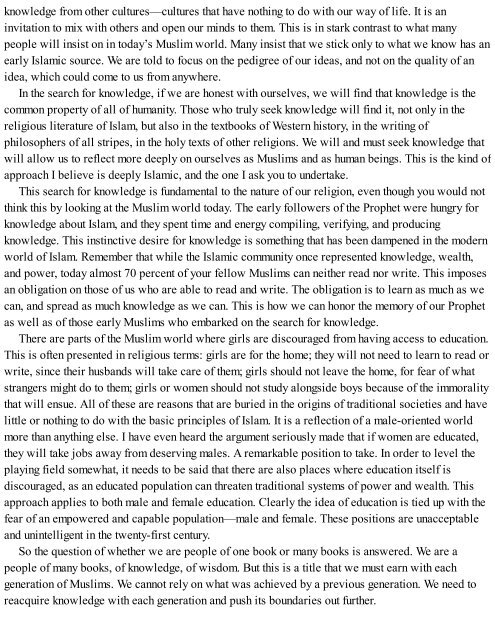1250119847
Create successful ePaper yourself
Turn your PDF publications into a flip-book with our unique Google optimized e-Paper software.
knowledge from other cultures—cultures that have nothing to do with our way of life. It is an<br />
invitation to mix with others and open our minds to them. This is in stark contrast to what many<br />
people will insist on in today’s Muslim world. Many insist that we stick only to what we know has an<br />
early Islamic source. We are told to focus on the pedigree of our ideas, and not on the quality of an<br />
idea, which could come to us from anywhere.<br />
In the search for knowledge, if we are honest with ourselves, we will find that knowledge is the<br />
common property of all of humanity. Those who truly seek knowledge will find it, not only in the<br />
religious literature of Islam, but also in the textbooks of Western history, in the writing of<br />
philosophers of all stripes, in the holy texts of other religions. We will and must seek knowledge that<br />
will allow us to reflect more deeply on ourselves as Muslims and as human beings. This is the kind of<br />
approach I believe is deeply Islamic, and the one I ask you to undertake.<br />
This search for knowledge is fundamental to the nature of our religion, even though you would not<br />
think this by looking at the Muslim world today. The early followers of the Prophet were hungry for<br />
knowledge about Islam, and they spent time and energy compiling, verifying, and producing<br />
knowledge. This instinctive desire for knowledge is something that has been dampened in the modern<br />
world of Islam. Remember that while the Islamic community once represented knowledge, wealth,<br />
and power, today almost 70 percent of your fellow Muslims can neither read nor write. This imposes<br />
an obligation on those of us who are able to read and write. The obligation is to learn as much as we<br />
can, and spread as much knowledge as we can. This is how we can honor the memory of our Prophet<br />
as well as of those early Muslims who embarked on the search for knowledge.<br />
There are parts of the Muslim world where girls are discouraged from having access to education.<br />
This is often presented in religious terms: girls are for the home; they will not need to learn to read or<br />
write, since their husbands will take care of them; girls should not leave the home, for fear of what<br />
strangers might do to them; girls or women should not study alongside boys because of the immorality<br />
that will ensue. All of these are reasons that are buried in the origins of traditional societies and have<br />
little or nothing to do with the basic principles of Islam. It is a reflection of a male-oriented world<br />
more than anything else. I have even heard the argument seriously made that if women are educated,<br />
they will take jobs away from deserving males. A remarkable position to take. In order to level the<br />
playing field somewhat, it needs to be said that there are also places where education itself is<br />
discouraged, as an educated population can threaten traditional systems of power and wealth. This<br />
approach applies to both male and female education. Clearly the idea of education is tied up with the<br />
fear of an empowered and capable population—male and female. These positions are unacceptable<br />
and unintelligent in the twenty-first century.<br />
So the question of whether we are people of one book or many books is answered. We are a<br />
people of many books, of knowledge, of wisdom. But this is a title that we must earn with each<br />
generation of Muslims. We cannot rely on what was achieved by a previous generation. We need to<br />
reacquire knowledge with each generation and push its boundaries out further.
















